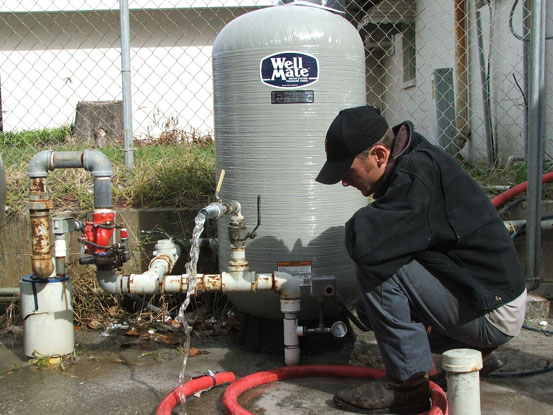Advanced Water Softeners: Bid Farewell to Hard Water Woes For Life
Advanced Water Softeners: Bid Farewell to Hard Water Woes For Life
Blog Article
Recognizing the Key Elements of Effective Water Purification Equipments

Importance of Water Purification Equipment
Water purification systems play a critical function in guaranteeing access to safe and clean alcohol consumption water by properly removing contaminations and pollutants. These systems are essential in resolving the expanding concerns over water top quality and the prospective health threats related to eating contaminated water. By utilizing various purification mechanisms such as reverse osmosis, triggered carbon, and UV sterilization, water filtering systems can efficiently get rid of hazardous materials like bacteria, infections, heavy metals, and chemicals from the water supply.
In addition, water filtration systems aid to boost the taste and smell of water by getting rid of chlorine, debris, and other pollutants that can influence its quality. Pump repairs & installation. This improvement in water top quality not only makes it much more tasty yet likewise urges individuals to drink a sufficient amount of water daily, promoting better hydration and overall health
Kinds Of Purification Elements

Physical filters are designed to physically stress out contaminations from the water. These filters can be constructed from materials like ceramic, carbon, and even sand, and they work by capturing fragments bigger than the filter's pores as water travels through.
Chemical filters utilize numerous chemical procedures to remove contaminants from the water. Examples include triggered carbon filters, which adsorb pollutants, and turn around osmosis membrane layers, which use pressure to different pollutants from the water.
Organic filters make use of living microorganisms like microorganisms or algae to break down raw material and contaminants in the water. These filters are often used in wastewater therapy plants or all-natural water purification systems.
Comprehending the various kinds of filtration components is critical for picking the most suitable water purification system for details filtration requirements.
Function of Debris Filters
Sediment filters play an important duty in water filtration systems by effectively capturing strong bits suspended in the water. These filters are usually the initial line of protection in a purification system, getting rid of bigger particles such as sand, silt, dirt, and corrosion before the water moves via finer filtration stages. By trapping these debris, the filters prevent them from getting to downstream parts, thus expanding the life expectancy and efficiency of the entire system.
The feature of sediment filters is essential in keeping water top quality and protecting delicate devices from damage created by debris. In addition, by eliminating noticeable fragments, sediment filters improve the clarity and taste of the water. Regularly cleansing or replacing debris filters is vital to make certain optimum efficiency. Ignoring this maintenance can result in clogging, reduced water circulation, and jeopardized purification performance. In general, debris filters are important parts that contribute substantially Read Full Report to the effectiveness of water filtering systems.
Duty of Activated Carbon Filters
Playing an important function in water filtering systems, triggered carbon filters are critical in eliminating pollutants and pollutants from the water supply. As water passes through the filter, the activated carbon attracts and holds onto the contaminations, guaranteeing that the water that comes out on the other side is cleaner and safer for usage.
Triggered carbon filters are very reliable at enhancing the preference and smell of water by decreasing chemicals that can influence its high quality. They are also qualified of getting rid of certain hefty steels like lead and mercury. In addition, these filters can assist avoid the buildup of bacteria and algae in water, additional boosting its general quality. As a result of their adaptability and dependability, triggered carbon filters are a key part in guaranteeing that water is detoxified to the greatest additional hints requirements before getting to consumers.
Understanding Reverse Osmosis Solutions
Reverse osmosis systems are sophisticated water filtration systems that utilize an advanced process to eliminate impurities and pollutants from alcohol consumption water. These systems work by using stress to the water, requiring it via a semi-permeable membrane. This membrane layer acts as a barrier, allowing just pure water molecules to pass through, while blocking larger molecules such as minerals, chemicals, and other contaminations. Because of this, the water that appears beyond is substantially cleaner and more secure for consumption.
One key benefit of reverse osmosis systems is their capacity to get rid of a wide variety of pollutants, consisting of hefty steels, dissolved microorganisms, viruses, and solids. This makes them very efficient in enhancing the total quality and safety and security of alcohol consumption water. In addition, reverse osmosis systems are relatively low-maintenance and can be set up under the sink or in a central filtration system, providing convenient access to clean water throughout the household. Overall, understanding how reverse osmosis systems work can help individuals make informed choices about their water purification demands.
Final Thought
In verdict, efficient water purification systems are vital for guaranteeing safe and tidy alcohol consumption water. By comprehending the feature and role of each part, individuals can make enlightened decisions when selecting a water filtering system.
Water purification systems play a Source crucial function in ensuring access to risk-free and clean alcohol consumption water by successfully removing contaminants and pollutants. By using various purification systems such as reverse osmosis, activated carbon, and UV sanitation, water filtering systems can successfully remove dangerous materials like bacteria, viruses, hefty steels, and chemicals from the water supply.
Sediment filters play a crucial role in water filtering systems by efficiently catching strong bits put on hold in the water (Water Treatment).Playing a crucial role in water filtering systems, triggered carbon filters are crucial in getting rid of impurities and contaminants from the water supply.Reverse osmosis systems are advanced water filtering systems that utilize an advanced process to eliminate pollutants and pollutants from alcohol consumption water
Report this page